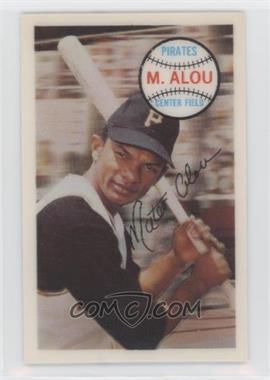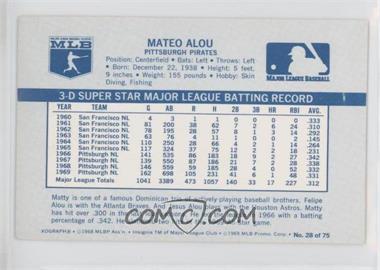1970 Kellogg's: Difference between revisions
| Line 3: | Line 3: | ||
1970 Kellogg's is a 75-card set and was the cereal maker's first venture into baseball cards. The design incorporates a brilliant color photo of the player set against an indistinct background, which is then covered with a layer of [[Lenticular Printing|lenticular plastic]] to simulate a 3-D look. (The same process would be used by Sportflics in the 1980s). | 1970 Kellogg's is a 75-card set and was the cereal maker's first venture into baseball cards. The design incorporates a brilliant color photo of the player set against an indistinct background, which is then covered with a layer of [[Lenticular Printing|lenticular plastic]] to simulate a 3-D look. (The same process would be used by Sportflics in the 1980s). | ||
The cards were individually inserted one per specially marked boxes of Kellogg's cereal. Kellogg's also distributed six-card rack-style packs which contained two iron-on team logo patches. | The cards were individually inserted one per specially marked boxes of Kellogg's cereal. Kellogg's also distributed six-card rack-style packs which contained two iron-on team logo patches. Complete sets were also available through a mail-in offer. | ||
Cards #16-#30 are believed to be in shorter supply than the other cards in the set. | Cards #16-#30 are believed to be in shorter supply than the other cards in the set. | ||
Latest revision as of 12:05, 8 March 2023
Description
1970 Kellogg's is a 75-card set and was the cereal maker's first venture into baseball cards. The design incorporates a brilliant color photo of the player set against an indistinct background, which is then covered with a layer of lenticular plastic to simulate a 3-D look. (The same process would be used by Sportflics in the 1980s).
The cards were individually inserted one per specially marked boxes of Kellogg's cereal. Kellogg's also distributed six-card rack-style packs which contained two iron-on team logo patches. Complete sets were also available through a mail-in offer.
Cards #16-#30 are believed to be in shorter supply than the other cards in the set.
Distribution
One card per specially-marked box of Kellogg's cereal.
Rack: Six cards plus two satin team logo patches per pack (MSRP: $0.49)
Reviews
Checklist
Base Set


- 1 Ed Kranepool
- 2 Pete Rose
- 3 Cleon Jones
- 4 Willie McCovey
- 5 Mel Stottlemyre
- 6 Frank Howard
- 7 Tom Seaver
- 8 Don Sutton
- 9 Jim Wynn
- 10 Jim Maloney
- 11 Tommie Agee
- 12 Willie Mays
- 13 Juan Marichal
- 14 Dave McNally
- 15 Frank Robinson
- 16 Carlos May
- 17 Bill Singer
- 18 Rick Reichardt
- 19 Boog Powell
- 20 Gaylord Perry
- 21 Brooks Robinson
- 22 Luis Aparicio
- 23 Joel Horlen
- 24 Mike Epstein
- 25 Tom Haller
- 26 Willie Crawford
- 27 Roberto Clemente
- 28 Matty Alou
- 29 Willie Stargell
- 30 Tim Cullen
- 31 Randy Hundley
- 32 Reggie Jackson
- 33 Rich Allen
- 34 Tim McCarver
- 35 Ray Culp
- 36 Jim Fregosi
- 37 Billy Williams
- 38 Johnny Odom
- 39 Bert Campaneris
- 40 Ernie Banks
- 41 Chris Short
- 42 Ron Santo
- 43 Glenn Beckert
- 44 Lou Brock
- 45 Larry Hisle
- 46 Reggie Smith
- 47 Rod Carew
- 48 Curt Flood
- 49 Jim Lonborg
- 50 Sam McDowell
- 51 Sal Bando
- 52 Al Kaline
- 53 Gary Nolan
- 54 Rico Petrocelli
- 55 Ollie Brown
- 56 Luis Tiant
- 57 Bill Freehan
- 58 Johnny Bench
- 59 Joe Pepitone
- 60 Bobby Murcer
- 61 Harmon Killebrew
- 62 Don Wilson
- 63 Tony Oliva
- 64 Jim Perry
- 65 Mickey Lolich
- 66 Coco Laboy
- 67 Dean Chance
- 68 Ken Harrelson
- 69 Willie Horton
- 70 Wally Bunker
- 71 Bob Gibson (1959 innings pitched is blank)
- 71 Bob Gibson
- 72 Joe Morgan
- 73 Denny McLain
- 74 Tommy Harper
- 75 Don Mincher
Inserts
Iron-On Patches
Two patches were available in specially-marked six-card rack packs. One patch for each of the then-24 MLB teams were produced.

